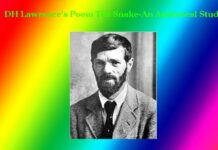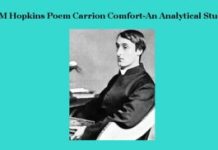Chief Characteristics of Nissim Ezekiel’s Poetry
Chief Characteristics of Nissim Ezekiel’s Poetry
Nissim Ezekiel, a distinguished Indian poet, left an indelible mark on the literary landscape through his profound exploration of various themes. His poetry is a vibrant tapestry, woven with threads of social commentary, cultural identity, humor, existential reflections, and emotional depth. By analyzing some of his representative poems, we can delve into the chief features that define his poetic genius.
Multifaceted Cultural Identity: One of the distinctive features of Nissim Ezekiel’s poetry is his exploration of multifaceted cultural identity. As an Indian Jew, Ezekiel’s own background significantly influenced his work. He deftly weaves together elements of his Indian heritage and Jewish identity, creating a unique perspective that is deeply rooted in both cultures. His poems often reflect the complexities and challenges faced by individuals who grapple with the fusion of diverse cultural worlds. In the poem “Enterprise” he says:
“I was ever a fighter, so – one fight more,
The best and the last!”
In these lines, Ezekiel portrays the struggle and resilience of an individual caught between cultural worlds. The persona’s desire to fight one last battle reflects the complexities of reconciling multiple identities.
Ezekiel’s portrayal of cultural identity in his poetry is nuanced and introspective. He delves into the conflicts arising from the clash between tradition and modernity, Eastern and Western influences, and the struggle to find a sense of belonging in a rapidly changing world. This exploration of cultural identity provides readers with a glimpse into the personal journey of the poet and invites them to reflect on their own cultural heritage and sense of self.
Incisive Social Commentary: Another prominent characteristic of Ezekiel’s poetry is his incisive social commentary. Through his verses, he fearlessly critiques various aspects of society, exposing its shortcomings, hypocrisy, and absurdities. Ezekiel’s keen observations and sharp wit are evident in his poems, where he tackles issues ranging from bureaucracy, politics, and societal norms to gender roles and the urban-rural divide. In the poem “A Very Indian Poem in Indian English” the poet says:
“To be Modern and cosmopolitan
Delhi is a proud City
Who is a proud City
But who is a proud Citizen?”
His social commentary is not limited to a specific time or place but remains relevant across generations. Ezekiel’s poetry serves as a mirror that reflects the social realities of his time and continues to resonate with readers, prompting them to question prevailing norms and institutions.
Humor and Satire: Nissim Ezekiel’s poetry often carries a delightful blend of humor and satire. He uses humor to lighten serious topics, making his poetry engaging and accessible. Ezekiel’s wit shines through in his playful wordplay, irony, and clever use of literary devices. The following lines may be quoted from his poem”Goodbye Party for Miss Pushpa T.S. as a proof of his satire and humor.
“Ladies and Gentlemen,
Miss Pushpa T.S. has just resigned.
Miss Pushpa T.S. will not entertain any longer.
She has had enough of artificial insemination.”
Through satire, Ezekiel employs a biting critique of societal constructs and conventions. He challenges conventional wisdom, subverts stereotypes, and exposes the inherent contradictions present in various institutions. His humorous take on everyday situations, cultural norms, and human behavior allows readers to reflect critically on the world around them.
Contemplative Existentialism: Ezekiel’s poetry delves into profound existential questions, reflecting on the fundamental nature of human existence. His contemplative verses invite readers to ponder the meaning of life, the passage of time, and the complexities of human emotions. The following lines from his poem “Background, Casually”are worth quoting to show his contemplative existentialism:
“Time is time. You are time.
The mind is just a dream
And I am the dreamer
Who escapes among the dreams.”
These lines reflect Ezekiel’s contemplation of time and existence, delving into the philosophical concept of the self and reality.
In exploring existential themes, Ezekiel’s poetry often transcends the boundaries of time and place, touching on universal truths and human experiences that resonate with a wide range of audiences. He delves into the depths of human consciousness, presenting a deep and introspective exploration of the human condition.
Emotional Intensity: Emotional depth is a hallmark of Nissim Ezekiel’s poetry. He skillfully captures a wide array of emotions, from joy and love to sorrow and pain. Ezekiel’s verses are imbued with a raw and heartfelt quality that allows readers to connect with the emotional landscapes he portrays.
In the poem entitled “Hymns in Darkness” he writes:
“The dry branches crack
Like a poor man’s bones.”
Ezekiel’s poignant imagery in this poem evokes empathy and emotional resonance, effectively conveying the harsh realities of poverty and suffering.
Whether depicting personal experiences or the collective struggles of humanity, Ezekiel’s poetry evokes empathy and a profound sense of understanding. His vivid imagery and poignant language make his emotional explorations relatable and leave a lasting impact on the reader.
Nissim Ezekiel’s poetry possesses a rich tapestry of characteristics that make it a timeless and treasured contribution to the literary world. His exploration of multifaceted cultural identity, incisive social commentary, humor, contemplative existentialism, and emotional intensity elevates his poetry to a level of depth and complexity that continues to resonate with readers across generations. Ezekiel’s work remains a powerful reminder of the enduring relevance of poetry as a means of self-expression, social critique, and a mirror reflecting the human experience. 0 0 0.
Chief Characteristics of Nissim Ezekiel’s Poetry
N. B. The article ‘Chief Characteristics of Nissim Ezekiel’s Poetry’ originally belongs to the book ‘Analytical Studies of Selected Indian English Poems‘ by Menonim Menonimus.
Chief Characteristics of Nissim Ezekiel’s Poetry
Books of Literary Criticism by M. Menonimus:
- World Short Story Criticism
- World Poetry Criticism
- World Drama Criticism
- World Novel Criticism
- World Essay Criticism
- Indian English Poetry Criticism
- Indian English Poets and Poetry Chief Features
- Emily Dickinson’s Poetry-A Thematic Study
- Walt Whitman’s Poetry-A Thematic Study
- Critical Essays on English Poetry
- Tawfiq al-Hakim’s Novel: Return of the Spirit-An Analytical Study
- Tawfiq al-Hakim’s Novel: ‘Yawmiyyat Naib Fil Arayaf’-An Analytical Study
- Analytical Studies of Some Arabic Short Stories
- A Brief History of Arabic Literature: Pre-Islamic Period (500 AD-622 AD)
- A Brief History of Arabic Literature: Early Islamic Period (622 AD-661 AD)
- Reviews on William Shakespeare’s Works
- Reviews of Charles Dickens’ Works
- Reviews of John Milton’s Literary Works
- Reviews of Some Iconic Travelogues
- Shakespeare’s Sonnets-Critical Studies
- Analytical Studies of Selected Poems of Sarojini Naidu
- Analytical Studies of Selected Poems of Rabindranath Tagore
- Analytical Studies of Selected Indian English Poems …
Additional Searches :











